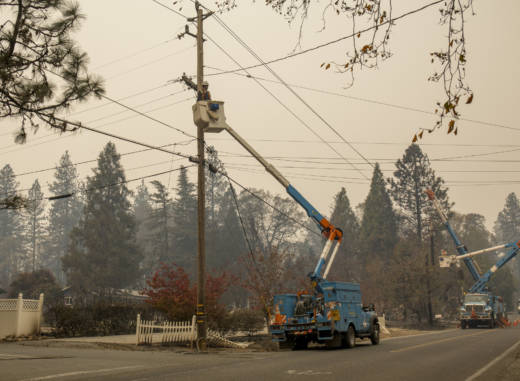Now, while that’s still front of mind for many state leaders, there are also rumblings about looking at the utility’s very existence. Perhaps most surprisingly, the state’s top utility regulator, Michael Picker, announced two weeks ago that the California Public Utilities Commission will examine the company’s corporate governance, structure and operations in light of the fires.
Picker declined an interview with KQED. But the statement came as a surprise to some observers because Picker and the CPUC in general have been criticized in the past for being too close to utilities, including PG&E.
This year seems to be different.
“I think we need to have all conversations,” agreed Assemblyman Chris Holden, who chairs the Assembly Utilities and Energy Committee.
But he also warned that lawmakers have to be cognizant of how any threats to PG&E’s financial health impact the markets and, by extension, ratepayers.
PG&E’s stock plummeted in early November when questions were first raised about whether utility equipment started the Camp Fire.
“When you’re looking at the cost of the utilities in terms of exposure and liability, that’s what’s sending the markets kind of in a tailspin,” said Holden. “And as a result of that, the cost of being able to borrow money to do projects and to even do some of the improvement work become very expensive.”
Holden is basically arguing that if Wall Street is worried about PG&E’s solvency, it will downgrade the company’s bond ratings, making it much more expensive to borrow money — and that ratepayers would ultimately pay that higher interest.
He supported legislation earlier this year that allows the state to issue bonds to help PG&E pay for the costs of the 2017 fires — bonds that ratepayers will pay off over two decades. Now, Holden says he’s looking at legislation to let PG&E do the same thing in the Camp Fire.
That rubs PG&E critics the wrong way. State Sen. Jerry Hill said earlier this year that lawmakers simply bought PG&E’s argument that bonds were the only option outside bankruptcy. Hill argued that shareholders should take more of a hit, not PG&E customers, noting that the CPUC guarantees PG&E a profit of 10.5 percent.
“There are alternative methods of funding and financing that could be created — whether it’s securitizing some of their profit going forward, whether it’s reducing their rate of return from 10½ percent for a period of time,” he said. “I think there are other avenues to explore. But all we saw in the Legislature and all we heard from PG&E is, ‘ You better do this or we may go bankrupt.’ ”
Hill, who has dogged PG&E since the company’s gas line blew up a San Bruno neighborhood in his district in 2010, killing eight people, said he believes there should be a bigger debate about PG&E’s very existence.
“They’re not the only electric utility in the country, but they seem to be the only one that has multiple problems on an ongoing basis — whether it’s the Rough and Ready Fire of the ’90s; the Butte County fire of 2015, where two people died and they were fined $8 million for their negligent illegal behavior and activities,” he said. “The fires of last year, and now the fires of this year. The common thread in there is PG&E.”
But what would it even mean to change PG&E’s structure? No one really seems to know — Northern Californians rely on PG&E’s huge grid to deliver their power, and that can’t change overnight.
State Sen. Bill Dodd wrote the wildfire bill that passed earlier this year, and co-chaired a special committee with Holden that was set up to examine wildfire prevention.
On the one hand, said Dodd, “I’m open. I think when you have a situation where so many lives have been lost over … not even two years, and you have so much damage –homes lost, businesses lost, outbuildings lost — you have to be open to anything that makes sense to improve the situation.”
But he rejected one idea floating around — breaking PG&E up into smaller companies — as premature.
“The idea of breaking PG&E up into multiple units until we understand how the grid operates and make the grid more safe is ridiculous,” he said. “Let’s say we had done that (already) … and now we had a brand-new company. They’d have the same grid system … so a company one-sixth the size of PG&E has the liability of this Camp Fire? I mean, I don’t think it makes sense.”
PG&E officials have demurred in recent weeks, telling KQED that the company is currently focused on recovery in Butte County.

